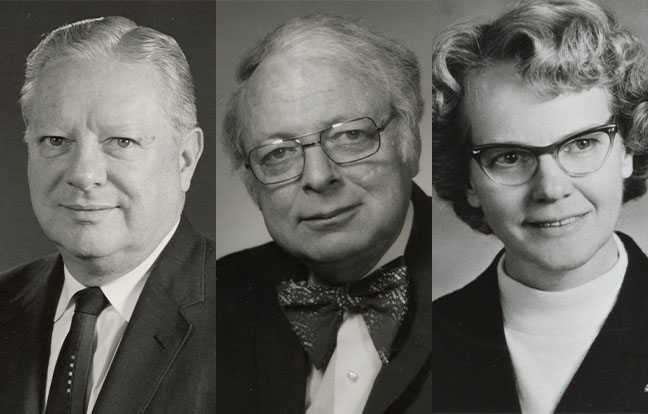Although specialization began to change the face of medical practice in the 19th century, most physicians still were general practitioners through the early 20th century.
After World War II, specialty residency programs overtook general practice, and by the late 1960s, medical professionals increasingly became concerned that this trend negatively affected rural communities.
Shortly after Cecil Wittson, MD, became dean of the College of Medicine in 1964, he planned to remedy rural health care workforce shortages. In 1965, the University of Nebraska College of Medicine appointed Fay Smith, MD, as the first professor of general practice. His appointment was only the third in the nation.
A 1933 graduate of the College of Medicine, Dr. Smith had practiced medicine in Imperial, Nebraska, since 1934 and also had served as mayor. He left in the middle of his second term as mayor to take the position in Omaha. Dr. Smith supervised the preceptor program, served as coordinator of the continuing education program for practicing physicians and was assistant dean by 1967. Dr. Smith died suddenly in 1968.
In 1969, the college created the division of family practice, which became a department in 1970. Francis Land, MD, was the first chair of the new department. Dr. Land practiced medicine in Fort Wayne, Indiana, for decades before he served as the Medicaid chief in Washington, D.C., from 1966 to 1969.
Dr. Land, with the American Medical Association, helped create “Meeting the Challenge of Family Practice,” also known as the Willard Report, which recognized family practice as a medical specialty. Family practitioners would have to pass board examinations to be certified. Medical faculty concentrated on internal medicine, pediatrics and psychiatry. They required additional training for obstetrics and gynecology.
During Dr. Land’s service as chair, the residency program expanded from four to 29 residents. Residents trained in towns across the state, such as Scottsbluff, Kearney, Crete and Friend. Faculty and preceptors encouraged residents to become comfortable practicing in communities where colleagues and facilities were farther away.
Margaret Faithe, MD, joined the family medicine faculty in 1969. Dr. Faithe, a native of Minnesota, had practiced in Nebraska and South Dakota. In the late 1970s, Dr. Faithe was responsible for developing a training course for displaced physicians from Vietnam. The program helped them assimilate into American language, culture and customs. It also provided practice opportunities in rural Nebraska. The state awarded Dr. Faithe an Admiralty in the Great Navy of the State of Nebraska for her efforts.
By recognizing the need for general practitioners in rural Nebraska, Dr. Land and others paved the way for creating the Office of Rural Health Initiatives, programs such as the Rural Health Opportunities Program and a thriving family practice department with preceptors across the state.

Thanks Erin. I always find your stories so interesting.